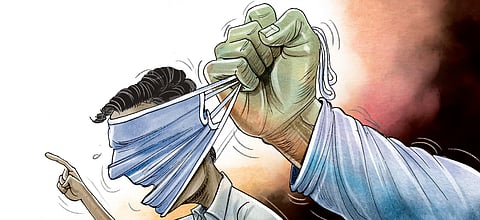

Manipur’s fight against Covid-19 has brought to the fore the best as well as the worst within itself. This has been so especially after the state’s two positive cases so far showed up on March 24 and April 2. On the one hand are a paranoid hate-mongering section whose voices are amplified by social media platforms, and on the other, an endless legion of young men and women coming out to raise resources to extend help to the needy.
Manipur’s first Covid-19 case was a student returning home from London, and the other, a participant of the Tablighi Jamaat congregation at Nizamuddin, New Delhi. Both have recovered and at least for now, the state is free of the virus. Obviously, the state’s landlocked remoteness has also helped in keeping the pandemic at bay.
The state government has earned praises for the assistance extended to those at home during the lockdown as well as those stranded outside the state. But it has also been on a spree of smothering voices of dissent. Even suggestions on where it might be going wrong in handling the crisis have landed people in police custody.
This intolerance of criticism has been an uneasy trait of this government long before the pandemic, but the cover provided by the crisis has only accentuated this draconian inclination. If an established media organisation is perceived to be the offender, the familiar strategy is Strategic Lawsuit Against Public Participation, SLAPP. These are lawsuits filed to intimidate and silence detractors by burdening them with costs—monetary as well as time and energy. A local newspaper Imphal Free Press is facing this plight for a report that suggested a victory celebration by Chief Minister N Biren Singh, on being ranked as 3rd best in one episode of a television channel’s ranking of relative popularity of chief ministers of India, was premature as he did not figure at all in subsequent episodes of the same competition. Rs
If the criticisms come from individual newspersons and bloggers, the retaliation has often been unwarranted arrest under draconian laws. The case of TV anchor Kishorechand Wangkhem is well known. He was arrested in November 2018 first under sedition charges for using profanities in criticising the chief minister and the BJP in a YouTube video. When the sedition charge was rejected by the district court as untenable and he had to be released, Wangkhem was rearrested the very next day under the National Security Act (NSA). The Manipur High Court ultimately intervened to have Wangkhem released five months later in April 2019. In December 2019, another young and popular YouTube blogger R K Ichan Thoibi was arrested for an irreverent satire of the CM. She was released after 10 days in custody on bail.
In September 2018, another youth activist, Popilal Ningthoujam, of the political party founded by iconic rights activist Irom Sharmila, People Resurgence and Justice Alliance, PRJA, was arrested for throwing eggs on the portraits of the prime minister and chief minister. This was during a protest against a midnight police raid at the Manipur University, where a strong agitation for the removal of the then vice chancellor, A P Pandey, had paralysed the institution. Ningthoujam was later released on bail. In February this year, an inquiry panel of the Union Ministry of Human Resource Development found Pandey guilty of financial and administrative irregularities and had him sacked.
This repression has only intensified during the Covid-19 lockdown. So far, five people have ended as victims. On April 8, Chingiz Khan, a JNU research scholar from Manipur, was arrested after a Manipuri translation of an article he had co-written in English for a New Delhi daily in 2019 on the marginalisation of Pangals (Manipuri Muslims) under the government, was published in a Manipuri daily. Devabrata (Bobby) Roy Laifungbam—a doctor by training, who runs an NGO, Centre for Organisation Research and Education, CORE—was picked up by the police for a Facebook post advising the chief minister not to waste valuable time and resources politicking and instead concentrate on the fight against Covid-19.
Konsam Victor Singh too was detained for a Facebook post enquiring about the amount the chief minister himself had contributed to the newly set-up CM’s Covid Relief Fund. Takhenchangbam Shadishkanta and Phajaton Kangjrakpam of the Youth’s Forum for Protection of Human Rights were arrested for a press release critical of the government’s management of the Covid-19 fight and for its plan to build a quarantine centre by requisitioning a stretch of paddy fields.
These arrests and repressive measures prompted the Civil Society Coalition on Human Rights in Manipur and United Nations, CSCHR, a conglomerate of nine human rights organisations in the state, to make an earnest appeal to the National Human Rights Commission on April 4 for intervention.
Manipur’s media have been indeed left badly mauled, first by the pandemic and the lockdown, which has depleted their businesses to a dangerous low, putting smaller organisations in an existential crisis. Now come these repressive measures aimed at silencing all voices
of dissent.
Pradip Phanjoubam
Editor, FPSJ Review of Arts and Politics
(phanjoubam@gmail.com)